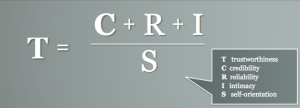Putting the “I” into “Intimacy”
 “Intimacy” belongs in business. Yes, intimacy. Not the kind that was the subject of classic ‘40s movies, but the kind that is essential to building trust.
“Intimacy” belongs in business. Yes, intimacy. Not the kind that was the subject of classic ‘40s movies, but the kind that is essential to building trust.
The Trust Equation
The Trust Equation is familiar to many of you, both regular and even occasional readers of this blog. It’s a formula for measuring our own trustworthiness through the Trust Quotient assessment.
For many people, Intimacy is the hardest piece of this simple formula to grasp and to put into practice.
Deconstructing Intimacy
We look at Intimacy in business relationships as having three components:
- Discretion – the wisdom to know what to do with information another shares with us
- Empathy – the ability to see another person’s point of view from the inside out; to identify with another person’s feelings, and
- Risk-taking – vulnerability
The first two are about the other person: safeguarding their sharing, picking up on their feelings and acting appropriately.
The last one – risk taking – is about you.
The “I” Part
The “I” part of intimacy means opening yourself up to the other person. It means becoming vulnerable. It really is all about you, and the risks you’re willing to take.
We often get asked what Intimacy sounds like or looks like in business settings. I would argue that it doesn’t require knowing the name of your client’s or colleague’s kiddos or pets (though for some people that works as Intimacy too), but rather saying or doing the thing that feels risky.
It may be as simple as asking for feedback, when you really don’t want to hear bad news: “I don’t feel that I’m doing this job to your satisfaction. Can we discuss it?”
It may be revealing something personal about yourself, perhaps saying at the start of a big presentation: “Although I am completely convinced that our plan is a good one, I find myself a little intimidated talking to this senior group.”
It may be a matter of just voicing something you both know to be true: “I believe your boss didn’t think we were the right supplier for this job, and you went out on a limb to get us approved. What are your particular concerns? How can we make you look good?”
The I in Risk, and in Trust
A good rule to remember about trust in business is that it’s generally not about you. Except, of course, when it is. And when it comes to intimacy, it is about you.
In our White Paper we show with hard data that the “I” factor drives more trust than the other three. And it is where risk shows up: taking the risk of Intimacy is what creates the reciprocal exchange that is trust.
If you’re lucky, your client or colleague or boss will lead by taking the first risk. If you don’t trust to luck, make some luck of your own. Take a risk. Lead with intimacy. Create some trust.
You can do that.


Sandy,
Thanks for the reminder. When I have felt comfortable enough to do this the relationship has almost always grown. In those cases where the risk had unintended consequences they were never large enough to worry about.
Take Good Care
John:
As we transitioned over to our new (!) website, I lost track of your comment, hence the tardy reply. Isn’t it interesting how we can believe, even “know” that this is true, yet still find it hard to practice?
I always enjoy your posts so much, Sandy — well-written, pithy, enjoyable to read. I especially appreciate the distinction in this one: what’s about you versus about them when it comes to intimacy — I’d never thought of it that way. Another way I’ve come to think about risking as a skill is that it requires you to expand your comfort with ambiguity and exposure, which matches up nicely with your simple, pithy word: “vulnerability.” Thanks for advancing the conversation about intimacy in the world. As the data suggest, it’s a conversation we all need to engage in more.
Andrea: I think you taught me this!
LOL — I taught you the three components (discretion, empathy, risk-taking). You took it to the next level with the “about them/about you” distinction — I’d never looked at it that way before.